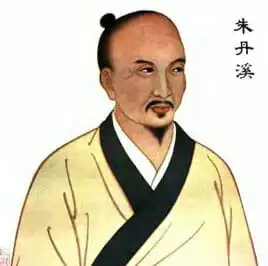Zhu Dan Xi and the Dao of Silence
“Lazy Cloud’s Nest 1”
Write poems when I’m sober, and sing when I’m drunk, I leave my fancy lute untuned, throw down my book and sleep. I don’t dream dreams of empire. To have a little idle time is good enough. The sun and moon race like the weaver’s shuttle. Wealth and rank are blossoms, bloom and fall, Spring goes, Why not enjoy it?
—(ALI HSI-YING, Translated: Jerome Seaton: The Wine of Endless Life—Taoist Drinking Songs from the Yuan Dynasty)
Zhu Dan-xi’s, Ge Zhi Yu Lun, is full of interesting observations on human nature and the connection between that nature and the nature of Heaven or the Dao. In him we see the convergence of the three great pillars of Chinese philosophical thought; Daoism, Buddhism, and Confucianism. While he considered himself a Confucian and embodied the principles of compassion and social service, many of his ideas are particularly influenced by Daoist strains of thought.

Zhu Dan xi and the conservation of sexual energy
His discussion on sexuality and the conservation of sexual essence to prevent disease displays this thinking. It is well known that in Daoist alchemy the search for the immortal elixir of life included human consciousness and the bodymind, thoroughly uncovering many insights into our energetic bodies. A central theme was and is the conservation of sexual essence to promote longevity, prevent disease and to increase vitality. This conservation, which I call sublimation, is an idea difficult to trace. It is possible that it was discovered simultaneously by monks and yogis from India and by Daoists. Or it could have been a practice that migrated with Buddhism into China. In yoga, the goal is to convert sexual energy and transfer it to the higher chakras for the attainment of enlightenment. In the practice of taijiquan and qigong, this sexual essence is typically concentrated in various dantians to increase vigor and qi.
However it arrived, Zhu Dan xi was an avid follower of the practice and he advocated many ideas that revolve around a simple practice of equanimity or balance, neither too much nor too little, that which in Buddhism is called “the middle path.”
His “Treatise on Ministerial Fire” is an elegant, if not abstruse at times, elaboration of the differentiation between “Heavenly” fire and “Ministerial” fire. For Dan-xi, fire is the most important of the elements, not surprisingly, as he was the inheritor of both the school of enriching yin and the school of enriching earth and in both of these schools fire plays a significant role. For Li Dong Yuan, the turbid yin fire that accumulates when the spleen malfunctions in its role of ascending the clear yang, mists the mind and is generative of a host of pathologies including fever, muscle-aches, fatigue, diarrhea, and dizziness as well as muddled thinking and unbalanced emotions. His ingenuity and genius was the decision to use sweet and warm tonifying herbs to clear the heat and revive the spleen. Li’s approach is reminiscent of homeopathy.
Zhu Dan-xi, true to the spirit of invention inherited from his teachers discusses in this work some of the more philosophical ramifications around fire. We learn that the ministerial fire is easily stirred, and once stirred, a host of emotions ensue because the organism has moved out of balance. When, however, the minister is being informed by and charged by the emperor, things remain in balance. The concept of the heart or emperor ruling the psychological roost is ancient and goes all the way back to the Neijing, but Dan-xi expounds the theory in a novel way combining and elaborating many thoughts by other great masters.
He says, “the human heart…put under the orders of the heart of the Dao is capable of being governed by stillness.”
Sri Yukteswar, the famous yogi from India and guru of Paramahansa Yogananda said something similar in his book, The Holy Science:
“The heart’s natural love is the principal requisite to attain a holy life. When this love, the heavenly gift of Nature, appears in the heart, it removes all causes of excitation from the system and cools it down to a perfectly normal state; and, invigorating the vital powers, expels all foreign matters – the germs of diseases – by natural ways (perspiration and so forth). It thereby makes man perfectly healthy in body and mind, and enables him to understand properly the guidance of Nature.”
This is a central idea with origins ancient in the rich fertile traditions of Eastern thought, it communicates something very different from western notions and that is that silence itself is sentient and is synonymous with love. Silence itself is alive and participating, in fact controlling life, but from a source of utter stillness, and this is why the Daoists say “The true Tao cannot be spoken,” and why they practice the concept of Wu Wei or “doing non-doing.”
This notion is radically different from our western philosophical focus, which posits that consciousness is a byproduct of matter. The eastern view holds that matter is informed and held together by the consciousness of love and silence.
In the Bible, Christ says, “seek and you shall find.” The Daoist version would read something like, “do not seek and you shall find.” Both seeking the source of this stillness and love, and not seeking it by knowing it is already the case, can lead to the same goal: resting in the source of that great peace.
Western philosophy, grounded in materialism has perhaps been afraid of nothing more than nothing. We want to see it, touch and measure it, or science holds it “unreal.” Nothingness is the concept behind our great fear of death. But here in this passage, Dan-xi communicates a central guiding theme, a torchlight that comes into the world from the spiritually focused East: silence is alive, in fact it is the source of the ten-thousand things, and it is calling for you, if you can quiet the mind and hear that silent voice within. The prognosis then becomes rather simple, either get still and allow the heart of the Dao to control your life or use your “ego” and have the fires of unwise living consume you.
“The True Man”
What is meant by a “true man”? The true men of old were not afraid when they stood alone in their views. No great exploits. No plans. If they failed, no sorrow. No self-congratulation in success. They scaled cliffs, never dizzy, plunged in water, never wet, walked through fire and were not burnt, thus their knowledge reached all the way to Dao.
—(The Way of Chuang Tzu, Translated: Thomas Merton)
Here we see the idea of one in tune with the Dao laid out in clear prose by Thomas Merton and this passage illustrates the ideas Zhu Dan-xi is tackling thousands of years later. Now, in the twenty-first century, these ancient eastern ideas are starting to make a home in the west. Even scientific methods cannot escape the wisdom of these sages and people are starting to question their deepest material assumptions. It is toward this silence that we return and strive to live by—the big great heart of the Dao.
@ James Whittle M.S. L.Ac. All rights reserved.
Email: james@blueridgeclinic.com
Call: 828-254-4405 for a Free Consultation
